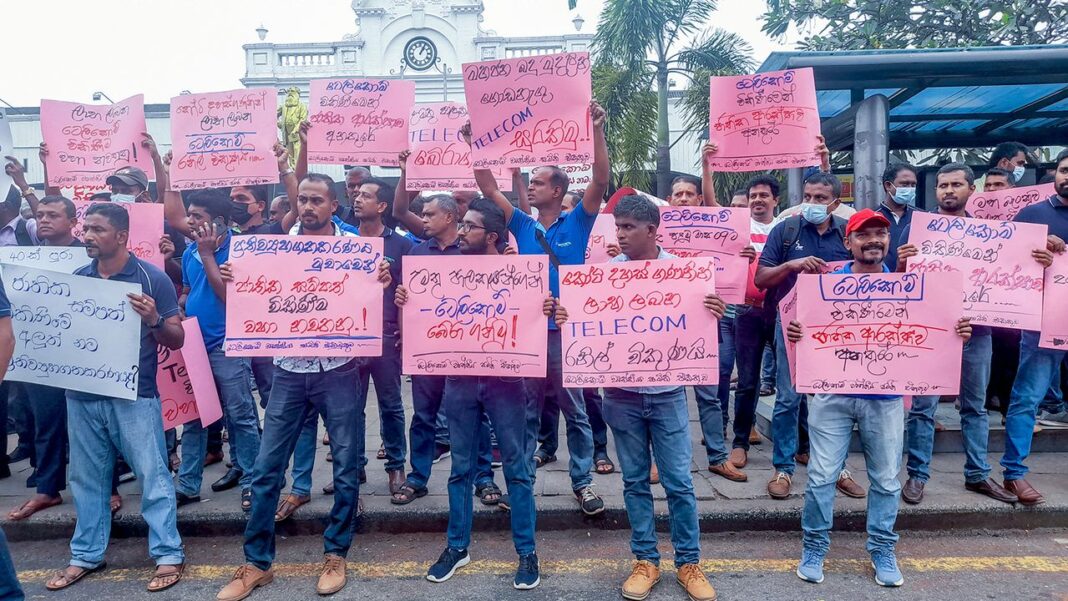The proposed Anti-Terrorism Act (ATA) is a direct response to the citizens’ protest movement of 2022 and the continuation of these protests this year, Professor Jayadeva Uyangoda, a political scientist, said during an online seminar on the ATA, organised by the Federation of University Teachers’ Associations (FUTA) recently.
“The ATA is a continuation of the Prevention of Terrorism Act (PTA) in a much repressive form. The terrorism it seeks to suppress is citizen’s political activism. The proposed law frames terrorism as a broad, arbitrary and an alarmingly undemocratic manner,” he said.Prof. Uyangoda said that people had used the term, ‘draconian’, to describe the PTA, however the new ATA went beyond the PTA in its repressive capacity.
“The present government and the President want to address two dimensions. One is that the authority and legitimacy of the current ruling class is in a severe crisis. Most of the people reject the political order run by the current politicians as a whole. This is a severe form of political crisis. The second aspect is that the executive presidential system introduced in 1978 has also faced a severe crisis. The crisis was so deep that unarmed protestors could dislodge a very powerful president. That crisis of executive political order continues,” he said.
What Wickremesinghe is trying to do is to resolve the twin crisis of the existing political order by using the state and political power he has access to. These twin crises occurred because politically conscious citizens not only reject, for the first time, the legitimacy of the political class but also, they are demanding a radical transformation of political culture and class, he said.
“This kind of transformative social demands are not acceptable for the ruling elites. So, what could they do? One thing they could do is introduce new legislation that would transform Sri Lanka into a police state under the supervision of the current political leadership. The political implications of the ATA are far reaching than the PTA or the emergency regulations that we have been having since the 1970s. ATA is trying to achieve what the PTA or the emergency regulations could not achieve, i.e. an effective police state. Sri Lanka is entering a state of heightened de-democratisation,” he said.
Sri Lanka has been in a path of rapid de-democratisation since the 1970s with sporadic attempts to re-democratise it by sections of the people and reformist politicians. However, last year Sri Lanka entered a new phase of re-democratisation with the protest movement.
“What the government has been trying to do is constantly terrorize the politically conscious and active groups of citizens,” he said.
The ATA criminalises the citizen’s political activism and in turn makes the citizen’s political activism an anti-state political activism, Uyangoda said.
“The punishment for activism is 20 years in jail. One of the lessons that the political class has learnt from the protests last year is that they should not allow Sri Lankans to become active, assertive citizens. They don’t only want passive citizens but also subservient citizens. They want to make politically active citizens to be criminals. That is the police state dimension of this,” he said.
He added the proposed ATA is also an attempt by the government to prepare for the social unrest that is likely to arise in the country due to its disastrous austerity measures.
Uyangoda suggests that the burden of economic revival is being placed solely on the poor and middle class, which has created an impending social crisis. He views the proposed ATA as a continuation of the current Prevention of Terrorism Act (PTA) in a much more oppressive form that seeks to counter citizens’ political activism. He warned that the ruling class’s undemocratic response to quash protests and demonstrations would further oppress the people and turn them into terrorists.
Uyangoda argued that the ruling class was aware that their economic programme was likely to lead to daily protests and demonstrations on the country’s roads, and they were trying to prevent such events by strengthening their capabilities and passing oppressive laws. He urged the government to reconsider their approach, warning that such laws will only exacerbate the social crisis and lead to further unrest.
“The middle class has become somewhat politically active. They are the ones opposing the new tax reforms the most. So, the proletariat and the middle classes have both become politicised. One of the ways that capitalism can respond to this is by forcefully de-politicising the people. To achieve this the government has to further strengthen the repressive laws and mechanisms it has. The new enemies of the ruling class are political citizens, the trade unions, the farmers, etc. The government wants to make any form of opposition and act of terrorism,” he said.
By Rathindra Kuruwita/ IS
